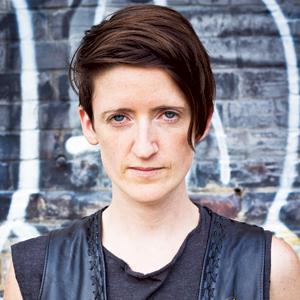
Vanessa Dunn Credit: Kyle Lasky

Heather Kirby Credit: Kyle Lasky
“Pretty” is not the word fans would use to describe Vag Halen.
“I really want us to be the sort of love child of Freddie Mercury meets Hedwig meets Iron Maiden. I really want this… mishmash.” Vanessa Dunn, “front womyn” for all-lesbian cock-rock cover band Vag Halen, explains the inspiration for her increasingly popular group over beers at The Yukon in Parkdale, where she tends bar as a day job. But the hard-edged, hard-rock outfit began its career as something considerably gentler.
“The original plan was to be Fleetwood Lez,” Dunn admits. But after a few rehearsals, it became clear that a Rumours-heavy set wasn’t quite what the group was looking for leading up to their 2011 debut at queer country night Steers & Queers, at the Dakota Tavern. “After the first practice, it just kinda fell flat,” Dunn says. “It was really pretty, but I just felt like it was not personally what I wanted. I didn’t want to be a performer in a really nice, pretty band.”
Shortly after that realization, Dunn and her wife, Katie Ritchie, began toying with the idea of forming a Van Halen cover band instead. “But then Katie was like, ‘I don’t think we can do all Van Halen covers because there’s not enough songs.’ Which I would argue, but whatever.” Eventually, they decided to cover music from across the dude-rock canon. That decision cemented the concept of Vag Halen and started them on a journey that led to opening for Limp Wrist at Vazaleen last Pride and an upcoming gig at the Rhubarb Festival kickoff bash at Buddies.
It’s unusual to see a cover band develop Vag Halen’s kind of following. But then again, bands like Vag Halen and Sheezer (an all-female Weezer cover band) are bringing in a very different crowd than you’d find at their male equivalents’ shows. Many people who’d stand in line for a Vag Halen show probably wouldn’t be caught dead at, say, a Rush tribute night in a pub. Cultural critic Carl Wilson, author of Let’s Talk About Love: A Journey to the End of Taste and a certified Vag Halen fan, has a theory as to why that is.
“The reason you wouldn’t go see those male cover bands,” Wilson says, “is that you’d assume they have an earnest, reverent approach to the material. But with both Sheezer and Vag Halen, they’ve chosen music to cover that, in two different ways, is very masculine-identified, so the subversive side is immediately apparent to anyone with a musical clue. Also, the people in these bands have reputations for other projects and activities around town, so it’s not just ‘gals do guy-rock,’ but these specific, funny, charismatic gals do guy-rock.”
Vag Halen definitely has an interesting pedigree. Guitarists Aimee Bessada and Dani Nash, drummer Susan Gale, and Ritchie, who plays bass, have all played in various bands around town. Heather Kirby is part of indie darlings Ohbijou, and keyboardist Stephanie Markowitz has collaborated on musicals with Maggie MacDonald. But what about lead singer Dunn? “I had never sung in my life,” Dunn admits. “I’m an actor; that’s my background. But I had done a couple performances for karaoke at the Henhouse, so I did a bit of a training ground there.”
For anyone who’s seen Dunn own the stage during Vag Halen’s climactic, six-and-a-half-minute rendition of “Layla” at Steers & Queers or belt her way through “Immigrant Song” at Vazaleen, this might be a little hard to believe; she comes across as a seasoned pro. “For me, what I wanted to do, what I feel like I was meant to do onstage wasn’t to sing pretty songs. I don’t have a pretty voice. I have a rock voice.”
Detractors might be tempted to dismiss Vag Halen as an ironic or novelty act, a category Dunn rejects. “I have no interest in being in an ironic band,” she insists. “Why would I work this hard for that?” As anyone who’s been to one of their gigs can tell you, the band rocks hard. Yet, it’s impossible to divorce the notion of a group of lesbians performing music often associated with macho gender norms and misogyny from ideas of camp and queerness.
“I think the queerness is the first impression,” Wilson allows, “often reinforced by lots of campy gestures and such by the performers — even playing it deadpan can be a kind of camp. But that kind of becomes background noise and the music does get to reassert its own inherent values along the way, so eventually you notice that you are also just having a good time rocking out — and likewise enjoying the sexiness of the performances in a non-ironic way. Both things can happen at once. You might shift around between those perspectives from moment to moment.”
The bait-and-switch becomes obvious when you attend a Vag Halen show. The crowd starts cheering for the concept, but pretty soon they’re cheering for the songs, whether the band’s rocking out to Black Sabbath’s “Iron Man” or Queen’s “I Want to Break Free.” And for Dunn, at least, her appreciation of the songs is sincere. “The reason why I love this music is because I had two older brothers growing up, and that was the music that we listened to,” she says. “The first person who I thought was the most beautiful woman I ever saw was Tawny Kitaen in a Whitesnake video.”
But that doesn’t mean she isn’t fully aware of the more problematic elements of a lot of the music Vag Halen covers. “They’re sort of guilty pleasures for a lot of the crowd, but it doesn’t lend itself well to the queer community and to women, a lot of that music. Because it has a misogynist element to it, and we totally realize that. And I basically wanted to take the most misogynist songs of all time and cover them, as females.”
What should you expect at the Rhubarb gig? Cock rock, for sure, and Dunn says the band has been starting to cover more punk songs — another genre ready for queer appropriation. “I think when you come to a Vag show, it really does feel like we’re adding this kind of queer, feminist voice to these songs, and there’s something fantastic about that, and powerful. And liberating.”

 Why you can trust Xtra
Why you can trust Xtra


